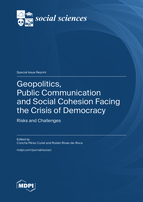Perceptions of Trust in the Context of Social Cohesion in Selected Rural Communities of South Africa
 Miguel Angel Martin Lopez
Miguel Angel Martin Lopez
Round 1
Reviewer 1 Report
We can identified a weakness in the research that should be corrected. Concretely, that involve less attention to the specific characteristics of rural communities. An unstated assumption is that rural communities may have low levels of trust due to socio-economic circumstances and lack of resources (p. 17). We believe it is essential to carry out in-depth reflection in order to clarify and properly explain why to choose these type of communities and the extent of the choice.
Author Response
Point 1: We can identify a weakness in the research that should be corrected. Concretely, that involve less attention to the specific characteristics of rural communities. An unstated assumption is that rural communities may have low levels of trust due to socio-economic circumstances and lack of resources (p. 17). We believe it is essential to carry out in-depth reflection in order to clarify and properly explain why to choose these types of communities and the extent of the choice.
Response 1: Please provide your response for Point 1. (in red)
Point 1: We have used the Integrated Development Plans of Cederberg local municipality and Kopanong Local municipality under which the two towns are located to provide additional information on the characteristics of the two rural towns. This concern was addressed briefly in the introduction but more in-depth in the methodology section.
Point 2: We have addressed the confusion that rural areas in South Africa tend to be more homogenous resulting in high levels of particularised trust. This confusion is mainly addressed in the introduction as follows: In South Africa, the residue of the distrust inherited from aparthied remains prevalent and evident. The distrust is still observably based on race, gender, class, ethnicity, and geography (Struwig et al, 2013). The one indicated by the reviewer on p.17 was deleted from the findings as an unstated assumption.
Reviewer 2 Report
The paper is interesting but a greater depth in the analysis part of the study itself would be recommended. It aims to investigate a very abstract concept and that is difficult to specify, but for this reason it may be more interesting to delve into the specific case. Another worrying issue, for me, is the possibility of extending what has been studied, which I think should be limited, since customs are not transferable or generalizable, but rather something very specific and very specific. The article is interesting but perhaps issues related to the most important concept in anthropology are missing: the ritual.
Author Response
Reviewer 2 Comments
The paper is interesting but a greater depth in the analysis part of the study itself would be recommended. It aims to investigate a very abstract concept and that is difficult to specify, but for this reason it may be more interesting to delve into the specific case. Another worrying issue, for me, is the possibility of extending what has been studied, which I think should be limited, since customs are not transferable or generalizable, but rather something very specific and very specific. The article is interesting but perhaps issues related to the most important concept in anthropology are missing: the ritual.
Point 1: We have addressed the confusion that rural areas in South Africa tend to be more homogenous resulting in high levels of particularised trust. This confusion is mainly addressed in the introduction as follows: In South Africa, the residue of the distrust inherited from apartheid remains prevalent and evident. The distrust is still observably based on race, gender, class, ethnicity, and geography (Struwig et al, 2013). The one indicated by the reviewer on p.17 was deleted from the findings as an unstated assumption. The issue of the concept of anthropology was confusing. However, we have provided in-depth information regarding trust in homogenous areas.
Round 2
Reviewer 2 Report
.





